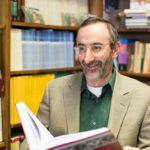
The prayers of the High Holidays emphasize themes of human guilt and divine forgiveness, and they often refer to human suffering as a punishment for our sins. They express our contrition and regret and express the hope that God, seeing our regret, will not punish us. In conveying these themes, the High Holiday prayers echo many passages from the Torah and the Prophets. But the idea that human suffering results from human misdeeds is not the only one found in the Bible. The Book of Psalms often portrays our suffering as a mystery, as undeserved, and as something we should protest. In this lecture Professor Sommer will discuss the different way these themes are handled in the Torah, the Prophets, and the Psalms, focusing especially on the idea of hester panim, or God’s hiddeness, and on a close reading of Psalm 27, which we recite every day during this time of year. Contrasting the Psalms with other biblical literature will make us aware of the variety of authentic religious outlooks for the penitential High Holidays season and the way differing religious personalities find expression in our tradition and in ourselves.
Click here to listen!

Benjamin D. Sommer joined The Jewish Theological Seminary faculty as professor of Bible in July 2008. Previously, he served as director of the Crown Family Center for Jewish Studies at Northwestern University, where he had taught since 1994. Dr. Sommer has been a fellow at the Israel Institute for Advanced Studies at the Hebrew University in Jerusalem, the Tikvah Center for Jewish Law and Civilization at the New York University School of Law, and the Shalom Hartman Institute in Jerusalem. He has served as a visiting faculty member in the Department of Bible of the Hebrew University in Jerusalem and at the Brite Divinity School in Fort Worth, Texas. He has received fellowships from the American Council of Learned Societies and the Yad Hanadiv/Berakha Foundation.